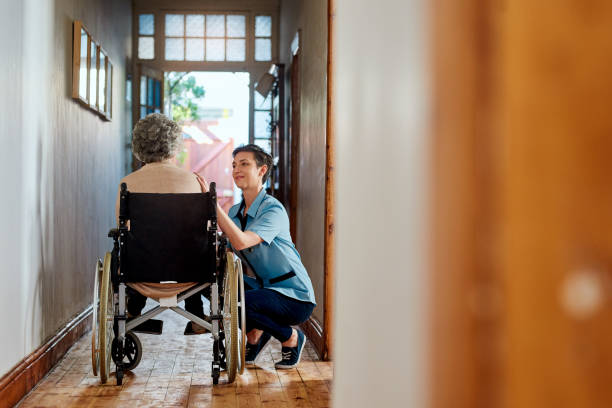The Role of a Special Needs Caregiver
Being a special needs caregiver is a vital and rewarding role that requires compassion, patience, and specialized skills. Special needs caregivers provide support and assistance to individuals with disabilities, helping them lead fulfilling lives. In this section, we will explore the understanding of special needs caregiving and the importance of providing specialized care.

Understanding Special Needs Caregiving
Special needs caregiving involves providing personalized care and support to individuals with physical, developmental, intellectual, or emotional disabilities. Caregivers play a crucial role in enhancing the quality of life for individuals with special needs by assisting them in various aspects of daily living.
The responsibilities of a special needs caregiver can vary depending on the individual’s unique needs and abilities. Caregivers may be involved in personal care duties, medical care duties, behavioral and emotional support, educational support, and promoting socialization and recreation.
Importance of Specialized Care
Specialized care is essential for individuals with special needs as it addresses their unique challenges and promotes their overall well-being. Here are some reasons why specialized care is crucial:
- Tailored Support: Special needs caregivers have the knowledge and skills to provide personalized care that meets the specific needs of individuals with disabilities. They understand the importance of adapting caregiving techniques and strategies to accommodate different abilities and challenges.
- Enhanced Independence: Specialized care focuses on empowering individuals with special needs to develop and enhance their independence. Caregivers work closely with individuals, helping them build life skills, promoting self-care, and encouraging independence in daily activities.
- Health Management: Special needs caregivers are trained to handle medical conditions and administer medications, ensuring individuals receive the necessary care and support to manage their health effectively. They play a vital role in monitoring health conditions, recognizing signs of distress, and facilitating medical appointments.
- Behavioral and Emotional Well-being: Caregivers provide emotional support and create a supportive environment for individuals with special needs. They are trained to manage challenging behaviors, promote positive social interactions, and help individuals develop coping mechanisms for emotional well-being.
- Educational Support: Special needs caregivers collaborate with teachers and therapists to support individuals’ educational needs. They facilitate learning activities, advocate for appropriate educational resources, and ensure individuals receive the necessary support to thrive academically.
- Socialization and Inclusion: Caregivers encourage social interaction, plan recreational activities, and promote community integration for individuals with special needs. They play a vital role in fostering a sense of belonging, building social skills, and creating opportunities for individuals to participate in community life.
Special needs caregivers provide a vital lifeline of support for individuals with disabilities. Through their specialized care and dedication, they contribute to the overall well-being and quality of life for those they serve.
Personal Care Duties
As a special needs caregiver, one of the primary responsibilities is to provide personal care assistance to individuals with special needs. This includes various tasks that help them with their daily activities, personal hygiene, and meal preparation.
Assisting with Daily Activities
Special needs caregivers play a crucial role in assisting individuals with their daily activities. This can involve helping them with tasks such as grooming, toileting, and mobility. The level of assistance required may vary depending on the individual’s specific needs and abilities. Caregivers may provide physical support, guidance, or supervision to ensure safety and independence.
Bathing and Dressing
Bathing and dressing are important aspects of personal care. Special needs caregivers often assist individuals with bathing, ensuring their comfort and safety. This may involve helping them get in and out of the bath or shower, washing their body, and assisting with grooming tasks such as brushing hair and teeth. Similarly, caregivers help individuals with special needs in selecting appropriate clothing, dressing, and maintaining personal hygiene.
Feeding and Meal Preparation
Proper nutrition is vital for individuals with special needs. Special needs caregivers are responsible for meal preparation and ensuring that individuals receive balanced and nutritious meals. This may involve planning and preparing meals according to dietary restrictions or specific nutritional needs. Caregivers may also assist with feeding, ensuring that individuals are able to eat safely and comfortably.
To provide a clearer understanding of the personal care duties of a special needs caregiver, the following table outlines some specific tasks:
Personal Care Duty and Description
Assisting with Daily Activities: Providing support and assistance with grooming, toileting, and mobility.
Bathing and Dressing: Assisting with bathing, grooming, and helping with dressing and personal hygiene.
Feeding and Meal Preparation: Planning and preparing nutritious meals, and assisting with feeding if necessary.
Personal care duties are just one aspect of the multifaceted role of a special needs caregiver. By fulfilling these responsibilities, caregivers help individuals with special needs maintain their personal well-being, dignity, and independence.
Medical Care Duties
Special needs caregivers play a vital role in providing medical care to individuals with special needs. This involves a range of responsibilities to ensure the well-being and health of those under their care. In this section, we will explore three key medical care duties performed by special needs caregivers: administering medications, monitoring health conditions, and assisting with medical appointments.
Administering Medications
Administering medications is an important aspect of a special needs caregiver’s role. They are responsible for ensuring that individuals receive their prescribed medications in the correct dosage and at the appropriate times. Caregivers must follow medication administration guidelines carefully to ensure safety and effectiveness.
The administration of medications may involve various methods, including oral medications, injections, topical treatments, or the use of medical devices. Caregivers must be well-informed about the specific medications, their potential side effects, and any necessary precautions or special instructions.
Monitoring Health Conditions
Special needs caregivers also play a crucial role in monitoring the health conditions of individuals under their care. This involves observing and documenting any changes in physical or mental health, noting vital signs, and reporting any concerns to healthcare professionals or family members.
Regular monitoring helps caregivers identify potential health issues early on, allowing for timely intervention and appropriate care. Monitoring may include tracking parameters such as blood pressure, heart rate, blood sugar levels, or any other specific health indicators relevant to the individual’s condition.
Assisting with Medical Appointments
Assisting with medical appointments is another essential duty of special needs caregivers. They act as advocates and liaisons between individuals with special needs and healthcare professionals. Caregivers schedule appointments, accompany individuals to medical visits, and provide valuable insights to medical professionals about the individual’s health and well-being.
During medical appointments, caregivers may assist in communicating the individual’s symptoms, concerns, or questions to healthcare providers. They may also help individuals understand medical instructions, follow-up care plans, or necessary lifestyle modifications.
It is important to note that the specific medical care duties performed by a special needs caregiver may vary depending on the individual’s condition, the level of medical expertise required, and any specific training or certifications they possess. Working closely with healthcare professionals and following care plans ensures the best possible medical care for individuals with special needs.
Behavioral and Emotional Support
When it comes to caring for individuals with special needs, providing behavioral and emotional support is a crucial aspect of a special needs caregiver’s role. This involves managing challenging behaviors, offering emotional support, and creating a supportive environment that promotes well-being and growth.
Managing Challenging Behaviors
One of the key responsibilities of a special needs caregiver is to effectively manage challenging behaviors that may arise. This requires patience, understanding, and the implementation of appropriate strategies to address and de-escalate difficult situations. By utilizing behavior management techniques, caregivers can help individuals with special needs navigate challenging behaviors in a safe and supportive manner.
Caregivers may employ various techniques such as positive reinforcement, redirection, and visual cues to encourage positive behavior and discourage negative behaviors. It’s important to work closely with the individual, their family, and any relevant professionals to develop a personalized behavior management plan that takes into account their unique needs and challenges.
Providing Emotional Support
Emotional support is a vital component of a special needs caregiver’s role. Individuals with special needs may face unique emotional challenges due to their condition or the difficulties they encounter in their daily lives. As a caregiver, providing a nurturing and understanding environment can help individuals feel valued, supported, and emotionally secure.
Engaging in active listening, offering empathy, and validating their emotions are essential in providing emotional support. Caregivers should foster open communication and encourage individuals to express their feelings, concerns, and aspirations. By creating a safe space for emotional expression, caregivers can help individuals develop coping strategies and build emotional resilience.
Creating a Supportive Environment
Creating a supportive environment is crucial for individuals with special needs to thrive. Caregivers play a vital role in establishing an atmosphere that promotes a sense of security, belonging, and inclusion. This includes adapting the physical environment to accommodate specific needs, such as ensuring accessibility and providing sensory-friendly spaces.
Moreover, caregivers can facilitate opportunities for social interaction and encourage meaningful relationships with peers, family, and friends. By promoting inclusion and facilitating participation in activities suited to their interests and abilities, caregivers can help individuals with special needs develop a sense of belonging and enhance their overall well-being.
In summary, behavioral and emotional support are integral aspects of a special needs caregiver’s duties. By managing challenging behaviors, providing emotional support, and creating a supportive environment, caregivers can make a positive impact on the lives of individuals with special needs, fostering their personal growth and enhancing their quality of life.
Educational Support
Special needs caregivers play a crucial role in providing educational support to individuals with special needs. This support encompasses a range of responsibilities to ensure that individuals receive the necessary educational opportunities and accommodations. Let’s explore three key aspects of educational support provided by special needs caregivers.
Facilitating Learning Activities
One of the primary duties of a special needs caregiver is to facilitate learning activities tailored to the individual’s needs. This involves creating a structured and supportive learning environment and implementing educational strategies that address the individual’s unique learning style.
The caregiver may work closely with educators and therapists to develop and implement individualized educational plans (IEPs) or behavior intervention plans (BIPs). These plans outline specific goals and strategies to support the individual’s educational progress and address any challenges they may face.
Collaborating with Teachers and Therapists
Collaboration with teachers and therapists is essential for providing effective educational support. Special needs caregivers communicate regularly with educators to ensure that the individual’s educational goals are being met and to address any concerns or challenges that may arise.
By sharing insights into the individual’s needs, progress, and challenges, the caregiver can contribute to the development of appropriate teaching strategies, accommodations, and modifications. This collaboration may involve attending meetings, such as individualized education program (IEP) meetings, to discuss the individual’s progress and make necessary adjustments to their educational plan.
Advocating for Educational Needs
Special needs caregivers also serve as advocates for the educational needs of the individuals in their care. They work closely with educators, therapists, and other professionals to ensure that the individual’s rights to an inclusive and appropriate education are met.
Advocacy involves actively seeking and implementing accommodations and modifications to support the individual’s learning and participation in the educational environment. It may also involve providing information and resources to educators and other stakeholders to enhance their understanding of the individual’s needs and the most effective approaches to support their education.
In fulfilling their role in educational support, special needs caregivers contribute significantly to the overall development and academic progress of individuals with special needs. By facilitating learning activities, collaborating with teachers and therapists, and advocating for educational needs, caregivers help create an inclusive and supportive educational experience for individuals with special needs.
Socialization and Recreation
In addition to fulfilling personal care and medical responsibilities, special needs caregivers play a vital role in promoting socialization, recreation, and community integration for individuals with special needs. This section explores some of the key duties related to socialization and recreation.
Encouraging Social Interaction
One of the important responsibilities of a special needs caregiver is to encourage social interaction for individuals with special needs. This can involve facilitating connections with peers, organizing playdates, or arranging opportunities for social engagement. By creating a supportive and inclusive environment, caregivers can help individuals with special needs develop social skills, build relationships, and foster a sense of belonging.
Planning and Participating in Recreational Activities
Recreational activities are not only enjoyable but also beneficial for individuals with special needs. Special needs caregivers often take the lead in planning and organizing recreational activities that cater to the specific needs and interests of the individuals they care for. These activities can include arts and crafts, sports, music therapy, outdoor adventures, and more. By engaging in these activities, individuals with special needs can enhance their physical abilities, cognitive skills, and overall well-being.
To provide a clearer understanding of the variety of recreational activities available, here is a table highlighting some examples:
Recreational Activity and Description
Arts and Crafts: Engaging in creative projects such as painting, drawing, and sculpture.
Sports: Participating in adapted sports like wheelchair basketball, swimming, or track and field.
Music Therapy: Utilizing music to address physical, emotional, and cognitive needs.
Outdoor Adventures: Exploring nature through activities like hiking, camping, or nature walks.
Drama and Theater: Engaging in acting, role-playing, and improvisational activities.
Promoting Inclusion and Community Integration
Promoting inclusion and community integration is another important aspect of a special needs caregiver’s role. Caregivers work towards creating opportunities for individuals with special needs to participate in community events, join clubs or organizations, and engage in activities alongside their peers without disabilities. By fostering a sense of belonging and encouraging community involvement, caregivers help individuals with special needs develop valuable social skills and establish meaningful connections.
In summary, special needs caregivers go beyond personal care and medical responsibilities to support the socialization, recreation, and community integration of individuals with special needs. By encouraging social interaction, planning recreational activities, and promoting inclusion, caregivers play a crucial role in enhancing the overall quality of life for those they care for.
Sources
Special Needs Caregiver Job Duties – CLIMB



